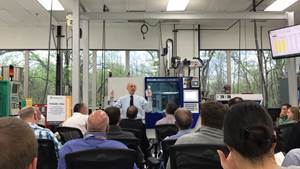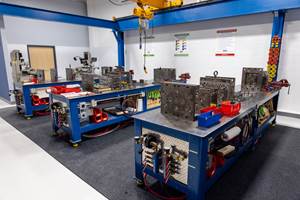Molders Try Cross-Training To Build Crucial Skills In-House
Processor Strategies
Despite high unemployment, many plastics processors still can’t find qualified workers to fill open positions that require specialized skills. So some are looking at further developing the skills of the employees they already have.
One of the major challenges facing American manufacturers is what some have referred to as the “skills gap.” Despite lingering high unemployment, many plastics processors still can’t find qualified workers to fill open positions that require specialized skills. In an effort to solve this significant problem, some processors are looking at further developing the skills of the employees they already have.
Thermo Fisher Scientific, a supplier of laboratory instruments and supplies, is one processor that’s implementing such a cross-training program. In late 2011, the company began deploying a custom program from Routsis Training, a plastics training specialist, for workers at its injection molding plant in Petaluma, Calif.
As part of the company’s Liquid Handling and Consumables ´óĎó´«Ă˝, the Thermo Fisher plant employs 140 people and manufactures disposable pipette tips, tubes, and other supplies used in laboratory research. Operations include part production and manufacturing support, tooling, maintenance, packaging, and warehousing.
Thermo Fisher is in the process of introducing the training program to the first 25 to 30 molding machine operators, said Ira Burks, human resource manager for West Coast operations. “Over time, we lose molders to retirement or industry change. One recent retiree had 25 to 30 years of molding experience,” Burks said. “It can be a challenge to find suitable replacements. So we began looking at ways to maintain our workforce.”
Thermo Fisher’s training program in Petaluma is designed to provide all machine operators with the same skills covering the diversity of machines at the plant. There are more than 200 presses in Petaluma, including proprietary equipment running high-cavitation tooling with complex operator interfaces.
Says Burks. “In the short term, our aim is for all of our operators to be at the same level of knowledge and experience across machines. This eliminates any issues when someone is out sick or on vacation, since others will be cross trained and comfortable working on all of the machines.”
The training program is set up for basic molding all the way through to advanced processing, covering part and mold design, hydraulics, geometric dimensioning and tolerancing, and several other areas. Using Routsis’ online training courses, employees learn at their own pace, reinforced by hands-on training in the plant.
Burks says Petaluma is working toward expanding training across the plant so that it can move other employees into molding technician positions. Long term, the company’s goals include lower scrap rates, reduced mold damage, and increased first-pass yield.
Many of those goals are shared by SL Tennessee LLC, a South Korean-owned auto parts maker in Clinton, Tenn., which also recently implemented a Routsis training program. SL Tennessee is training mold technicians, supervisors, and tooling and maintenance personnel with a mix of hands-on, classroom, on-the-job, and online courses. The program covers molding basics, blueprint reading, material drying, mold maintenance, mold setup, decoupled molding, and more. Employees verify that they’re retaining and using the skills they’ve learned through worksheets used on the floor.
Like Thermo Fischer Scientific, SL Tennessee is looking to use the training to develop molding technicians from within its plant. In the process, the company has achieved immediate performance benefits since launching its training program in late October 2011.
“We have a large number of new technicians, and the training is helping them advance their startup skills, which lowers our scrap rates,” states Mike Ballew, processing engineer. Adds Linda Bass, training coordinator, “Cycle time and downtime have gotten a lot better, too. The broader, more consistent knowledge on the floor has benefited us a lot
Related Content
Spark Stages Bring Education to NPE2024 Show Floor
Three stages, five days of programming and more than 75 sessions — the all-new Spark Stages at NPE2024 give attendees a chance to rest their feet and exercise their minds.
Read MoreThe Experience Curve and Well-Trained Process Technicians
Pairing external big picture training with internal job-specific instruction can help your process technicians meet quality expectations as well as production targets.
Read MoreThe Cost of High Employee Turnover in Injection Molding: Why Retention Matters
Starting in molding in 1993 and clocking in for nearly every job on the floor over the intervening decades, I’ve seen all sides of the hiring, training and retention process in the industry. Here are my thoughts on how to keep your most important asset — your people.
Read MoreAmerican Injection Molding Institute Opens Mold Maintenance Classroom
The Beaumont subsidiary has opened the Mold Maintenance Center of Excellence classroom at its Erie, Pennsylvania, headquarters.
Read MoreRead Next
People 4.0 – How to Get Buy-In from Your Staff for Industry 4.0 Systems
Implementing a production monitoring system as the foundation of a ‘smart factory’ is about integrating people with new technology as much as it is about integrating machines and computers. Here are tips from a company that has gone through the process.
Read MoreSee Recyclers Close the Loop on Trade Show Production Scrap at NPE2024
A collaboration between show organizer PLASTICS, recycler CPR and size reduction experts WEIMA and Conair recovered and recycled all production scrap at NPE2024.
Read MoreMaking the Circular Economy a Reality
Driven by brand owner demands and new worldwide legislation, the entire supply chain is working toward the shift to circularity, with some evidence the circular economy has already begun.
Read More












